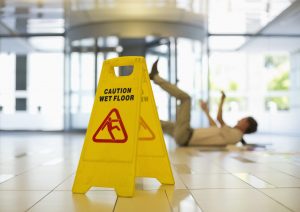Does Florida Have a “Wet Floor Sign Law”?
 Wet walking surfaces are a top cause of slip-and-fall injuries in Florida. But are businesses required to post a “wet floor” sign to warn you?
Wet walking surfaces are a top cause of slip-and-fall injuries in Florida. But are businesses required to post a “wet floor” sign to warn you?
A wet floor sign may indeed play a big role in the strength of your case, but the simple answer to the question about whether Florida has a “wet floor sign law” is no.
As a Fort Myers slip-and-fall injury attorney, I have successfully handled many of these premises liability claims. It is important to understand that these cases are often more complicated than they may initially appear. The outcome will depend heavily on the factual circumstances. The presence (or lack thereof) of a wet floor sign is just one of those.
Florida Slip-and-Fall Laws
To determine liability in slip-and-fall cases, Florida follows a general negligence theory. That is, one party has a legal responsibility to another and fails in that responsibility, resulting in an injury for which the second party may be compensated by the first.
Slip-and-fall claims fall under the umbrella of premises liability. These are the laws the protect victims of all ages who are injured on someone else’s property. Many public and private establishments have a legal duty to follow certain established safety standards, operate the property in way that doesn’t pose unreasonable dangers and warn about hazards of which they are aware or should be aware – particularly when welcoming people onsite for the financial benefit of the property owner.
Specifically as it pertains to slip-and-fall cases involving “transitory foreign substances” at business establishments, F.S. 768.0755 places the proof burden on the injured person to show the business had actual or constructive knowledge of the dangerous condition and should have taken action to remedy it before someone was hurt. Actual knowledge can be established through evidence the business created the condition or proof that staff/managers were made expressly aware of it. Constructive knowledge can be established by way of circumstantial evidence that shows:
- The condition existed for an extensive period of time that the business should have discovered it in the course of exercising ordinary care.
- The condition was foreseeable because it occurred frequently.
- Photos taken at the scene;
- Surveillance footage;
- Incident reports prepared by the business owner;
- Testimony of paramedics;
- Statements made by witnesses;
- Opinions of medical professionals.
Do I Have a Case if The Business Posted a Wet Floor Sign?
Wet floor warning signs will not make or break your Florida slip-and-fall case. However, they can undoubtedly have an impact. A warning sign will not provide 100 percent blanket protection to the business owner, particularly if he/she created the dangerous condition and/or it was not remedied in a timely fashion. On the other hand, if there was a wet floor sign placed in the area of your fall it would certainly be difficult for the property owner to claim that they did not have notice of the defective condition.
However, if there was a slip-and-fall in an area that is clearly marked with a wet floor sign, the defense may argue you were adequately warned or at the very least, you are entitled to lesser damages under Florida’s comparative negligence law. The comparative negligence law reduces the amount of money an injured person can collect by the percentage of his/her own fault. For instance, if you incurred $150,000 in damages but were 35 percent at-fault for not heeding a wet floor sign, the total you could collect would be $97,500.
We will also want to know how far away from the fall site the sign was located (was it on the other end of a long aisle?). This was will give an indication as to whether the warning provided was adequate. So too will the length of time the floor’s dangerous condition existed without remedy by the business. We can sometimes establish this by showing evidence of dirt or smudges (as opposed to a fresh, clean spill or drop of water) that may indicate the condition had been there for some time.
The bottom line is that while a wet floor sign is not fatal to your case, the lack of one may help your case. The exact circumstances will need to be carefully reviewed by an experienced Fort Myers slip-and-fall injury attorney.
If you are injured in Fort Myers, Naples or Key West, contact our injury attorneys at The Garvin Firm at 800.977.7017 for a free initial consultation.
Additional Resources:
F.S. 768.0755, Premises liability for transitory foreign substances in a business establishment
More Blog Entries:
What are Tort Claims? Key West Injury Lawyer FAQ, Dec. 10, 2020, Fort Myers Slip-and-Fall Attorney Blog





 Florida Personal Injury Lawyer Blog
Florida Personal Injury Lawyer Blog










